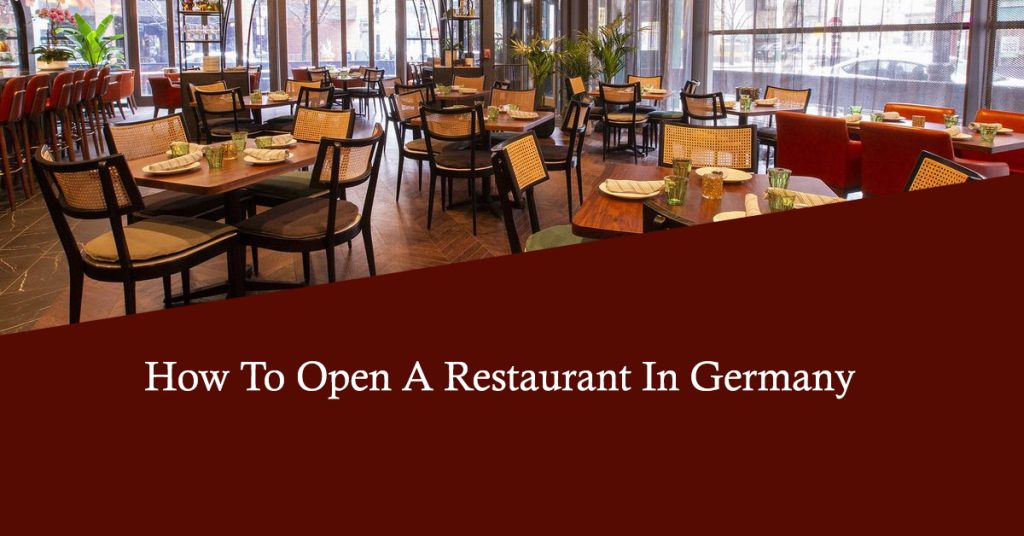One viable option for German businesses is to open a restaurant. The food service business is well established and lucrative. While full-service restaurants dominate the industry in terms of revenue, fast food is dominated by foreign companies.
Consumers in Germany are a major driving force in the commercial foodservice industry, but changing client dynamics, such as an ever-growing foreign population and an influx of annual visitors, also play a role. This means that the market features eateries that appeal to a variety of tastes, including those that specialize in Asian, European, and local fare.
There are many things to do before and after a restaurant opens its doors for business. We outline some of the most crucial choices restaurant owners must make below:
- The first stage for entrepreneurs in the restaurant industry is to settle on a distinct idea and begin developing the restaurant’s brand. It will be crucial for the restaurant’s market positioning and brand and marketing tactics to reflect the sort of cuisine provided and the aesthetic of the space.
- Choosing what to serve on the menu is another crucial step in starting a food business; early investors have limited input and are thus limited to deciding on broad food categories.
- Investors should begin working on a business plan once decisions are made about the actual restaurant profile; this is the time to prepare a market analysis in the city or region when the investor intends to open the restaurant; a financial projection and marketing strategies can be taken into consideration at this stage.
- Pick a spot: a restaurant’s success depends in large part on its location. The ideal spot would be in a high-traffic area, among other businesses offering similar services. Investors should also make sure that the restaurant’s target customers are representative of the neighborhood.
- Incorporate: Investors will need to set up a company in Germany, with the private limited liability company (GmbH) being the most common business form for this purpose; the minimum share capital for this business form is 27,000 euros, which can also include in-kind contributions; the founders are only liable to the extent of the capital invested in the business; a managing director must be appointed for the company; and one of our lawyers in Germany can assist with the appointment of the managing director.
- Acquire the necessary licenses; Germany has strict regulations regarding the food industry, and while there are no specific requirements for the qualifications of restaurant owners, the restaurant and its location must be in accordance with these rules.
Acquiring the necessary permits and approvals to operate a food business in Germany is an integral part of the process to ensure the highest standards of hygiene and food safety.
Restaurateur licensing in Germany
The Company Law of Germany specifies the steps that must be taken in order to create a company for the purpose of founding a restaurant. In addition to deciding on a business structure, you’ll need to get a license showing that the location and infrastructure are suitable for operating a food business. Frittenabitur certificates are required to prove that your staff members have the skills necessary to do their jobs. Investors who are interested in the food industry but choose to operate a food truck rather than a traditional restaurant will need to apply for and receive a permit designated for mobile businesses. If you need further information on the necessary permissions, one of our attorneys in Germany would be happy to assist you. Starting a restaurant or food truck company does not need any specific skills on the part of the entrepreneur. Therefore, it is not necessary for him to have any training or experience in the culinary arts.
There is an annual threshold at which restaurants will be required to register for VAT reasons.
Investors from outside of Germany who want to create a restaurant must typically operate as a sole proprietor. This necessitates either applying for a permit for self-employed persons after they are already in the country or, in the case of non-EU/EEA citizens, applying for the appropriate visa to enter Germany and then applying for a residence permit depending on their kind of business.
Investors who create a restaurant in Germany will need to find skilled staff in addition to managing the basic company creation procedure. Staff, including the head chef, the head sous chef, the cooks, and the general manager, all play crucial roles in ensuring that diners have a pleasant dining experience.
Legal requirements for ensuring that food is safe in Germany
The Lebensmittel-, Bedarfsgegenstände- und Futtermittelgesetzbuch (LFBG) is Germany’s primary legislation addressing food and feed. It contains the country’s food safety regulations. This law was modeled after and harmonized with European laws that govern the manufacturing and sale of food in restaurants and similar establishments. If an international investor wants to legally run a restaurant in Germany, they must adhere to the strict storage and preparation regulations set forth by the LMHV.
Keep Reading Cafeer for the latest News & Information.

